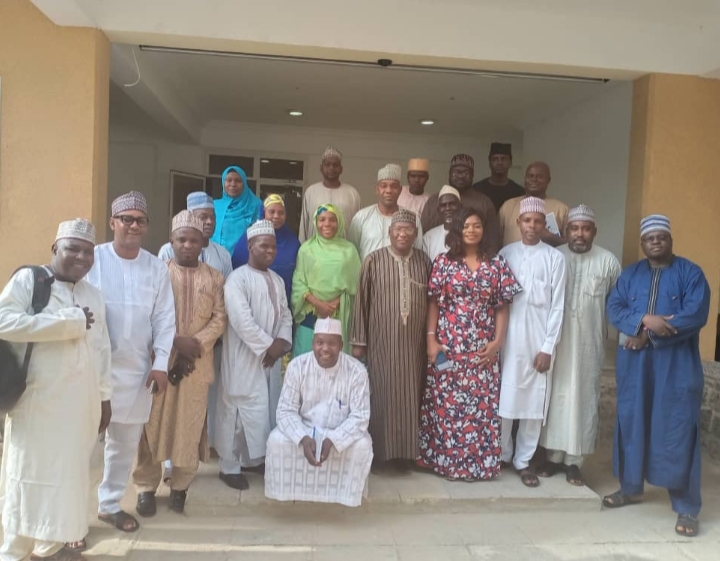Kano reactivates TB Domestic Resources Mobilisation Committee, incorporates HIV/AIDS
The expansion of the mandate of the Kano State Domestic Resource Mobilization (DRM) Committee for Tuberculosis to also cover HIV/AIDS, was jointly agreed upon by stakeholders in the state and USAID’s Health Policy Plus (HP+) project

Kano is the Nigerian state with highest burden of Tuberculosis (TB) , after Lagos, according to the Federal Ministry of Health. This has necessitated many interventions by government and development partners in Kano including the United States Agency for International Development (USAID); through its Health Policy Plus (HP+) project. HP+ is a five-year project that seeks to, “Improve the enabling environment for equitable and sustainable health services, supplies, and delivery systems through policy design, implementation, and financing.”
Across two USAID priority states of Lagos and Kano and at the national level in Nigeria, the project is implementing series of activities aimed at achieving sustainable financing for HIV and TB programs, by identifying pathways for sustainable financing of TB and HIV services; advancing strategic purchasing of TB and HIV services through innovative provider payment mechanism and state health insurance schemes; as well as strengthening state-level capacity to effectively allocate and execute TB and HIV funding.
Although there was a 100% increase in TB funding allocation in Kano state in 2019 – from 20 million to 40 million – thanks to the precursor of HP+, USAID’s Health Finance and Governance (HFG) project, which supported the state TB program on sustainable TB financing through Domestic Resource Mobilization (DRM) until the end of 2018. However, budget releases had remained a serious challenge. It was against this backdrop that the HP+ project is currently supporting the reactivation of the Kano State TB Domestic Resource Mobilization Committee as well as the integration of HIV/AIDS into the Committee’s mandate.
The DRM Committee aim to improve local domestic resource funding for TB and HIV/AIDS control programs in the state; promote Public-Private Partnerships (PPP); and ensure effective and efficient appropriation, releases, utilization and management of funds for TB and HIV. This will ultimately ensure Kano state government takes complete ownership of TB/HIV interventions through increased funding and efficiency of TB and HIV/AIDS spending towards making Kano TB and HIV/AIDS free.
Dr Ibrahim Aliyu Umar is Program Manager of the TB, Leprosy and Buruli Ulcer Control Program at the Kano State Ministry of Health who believes TB and HIV are like Siamese twins hence the necessity of the integration of HIV into the DRM Committee for TB. “There is a close relationship between TB and HIV, they are like Siamese twins. TB is the number one killer disease among people living with HIV while HIV positive persons have 30% – 40% increased tendency to develop TB,” he said.
“Kano state has one of the highest burdens of the two diseases [TB and HIV] in Nigeria; control of the two diseases is capital intensive hence government and partners’ support is not enough; since development partners’ come and go. We therefore need to take over the complete funding of the diseases; we are looking at available resources from private sector organizations within Kano state. Through their Corporate Social Responsibility (CSR) they can support government efforts by let’s say donating machines for TB diagnosis and microscopes. For example, Chevron donated a TB Chest Clinic to Kurna PHC in Dala Local Government Area. We are also looking at the new government agencies for health financing in the state for more funding.”
Pharm Tijjani Yola is a director at the Kano State Agency for the Control of AIDS (Kano SACA) who says his agency had in recent years witnessed dwindling funding support from donor agencies hence the need for more funding from government and the private sector. “The corporate organizations and market associations need to come together to ensure continues funding for HIV/TB. There is still need for community awareness because of persistent misconceptions about HIV. As Muslims, the idea of assisting one another is not new to us,” he said.
“Integrating HIV into the TB DRM Committee will help improve service delivery in the health sector, generally. Although HIV prevalence has reduced significantly in Kano which means we have made progress, we need to consolidate on our achievements and ensure judicious utilization of resources meant for HIV/TB control. AMMKaS advocates for increased funding allocation, releases as well as ensuring effective implementation of budgets,” said Hafsat Kolo, Co-chair of the Accountability Mechanism for Maternal and Child Health in Kano State (AMMKaS).
Dr Dauda Sulaiman Dauda, Nigeria Country Representative of Palladium, the leading implementing partner of HP+ project, says the need to expand the scope of the Kano State TB DRM Committee to cover HIV was jointly agreed upon by stakeholders in the state and the HP+ project. He describes the Committee’s major task as that of, “Driving advocacy, mobilizing resources for the two diseases [TB and HIV]; analysis of reports and studies that will arise from joint activities as well as looking at budget performance across the two budget areas. If it lives up to expectation, the DRM Technical Working Group could serve as a veritable tool for the eradication of the two diseases.”
A communiqué issued at the end of a recent one-day workshop organized by the Kano State Ministry of Health in collaboration with the HP+ project, for the reactivation of the TB DRM Committee and integration of HIV/AIDS into the committee’s mandate, called for the hosting of a TB Public-Private Mix (PPM) summit in Kano State; development of a roadmap for the integration of TB/HIV into the Kano State Contributory Healthcare Scheme (KSCHS); improved demand creation and awareness efforts for TB and HIV/AIDS as well as the sustenance of the quarterly State TB/HIV DRM Committee meetings, amongst other resolutions.
The workshop was attended by members of the Kano State DRM Committee for TB/HIV including representatives of development partners such as USAID’s Sustaining Health Outcomes through the Private Sector (SHOPS) Plus project; KNCV Tuberculosis Foundation (KNCV TB) and FHI360.










